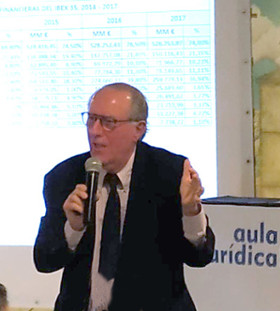José María Gay de Liébana teaches the inaugural conference of the 4th Spanish National Convention on Bankruptcy Law
 José Maria Gay de Liébana, professor of the Faculty of Economics and Business of the University of Barcelona and full academician of the Royal European Academy of Doctors-Barcelona 1914 (RAED), gave on January 31 the inaugural conference of the 4th Spanish Convention on National Bankruptcy Law, held in the Seville town of Carmona. The paper was entitled “¿Por qué fracasan las empresas? Síntomas y causas” (Why do companies fail? Symptoms and causes).
José Maria Gay de Liébana, professor of the Faculty of Economics and Business of the University of Barcelona and full academician of the Royal European Academy of Doctors-Barcelona 1914 (RAED), gave on January 31 the inaugural conference of the 4th Spanish Convention on National Bankruptcy Law, held in the Seville town of Carmona. The paper was entitled “¿Por qué fracasan las empresas? Síntomas y causas” (Why do companies fail? Symptoms and causes).
In his presentation, the academician focused on the analysis of the balance sheets of large Spanish and North American companies in recent years, in order to know how to interpret weaknesses and vulnerabilities from the patrimonial and financial point of view that allow an early diagnosis of crisis situations. He also delved into the analysis of income accounts of companies belonging to different sectors, shredding and deepening the symptoms that denote difficulties from the economic perspective and that constitute warning signs in critical states.

In the course of his speech, Gay de Liébana explained the causes that can lead to a State of crisis, the need for a second opportunity in Spain for those entrepreneurs who have experienced a bankruptcy situation and, in particular, he warned of the complexity of the formalities of the demanding accounting regulations that ends up confusing in relation to financial information.
The speaker also seriously questioned, before an audience composed of magistrates, insolvency administrators, lawyers and economists, the role of supervisory and control bodies and their lack of reaction to situations which clearly indicate, in his opinion, that an entity is in trance of suffering an economic and financial crisis.
The Spanish National Convention on Bankruptcy Law is one of the most important events held in Spain on this subject. Its objective is to know in depth and update the phenomenon of insolvency and the bankruptcy process that regulates it, tackled from the problems and the legal and economic solutions that the daily practice generates to the professionals who are dedicated to the insolvency world.





